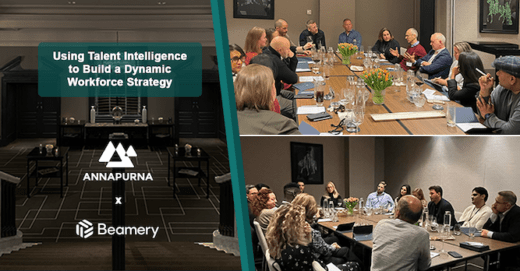We are seeing an exciting trend in recent months as more client organisations structure their people vision alongside innovative and practical deployment plans that are very specifically matched to their business goals.
Over recent years, businesses have been focused on cost utilisation and spend, understandably given the economic environment we’ve been in.
Refreshingly, we are seeing a turn in how businesses are thinking and how growth is at the forefront of their minds. In addition, there is an ever-increasing recognition that employees make or break any strategic vision, and this can only be achieved if there is rigour and focus on creating attraction, engagement and retention plans for all levels of an organisation.
We want to take the opportunity to share our insights as to what has worked in recent sessions on people visioning and planning:
Step ONE: Bring your leadership team and influencers together. These are the people who make decisions and influence the direction of the business. Whether it be the business owner, CEO, senior leaders or key influencers. Your people vision and plan will only be successful with their buy-in and the best way to achieve this is to get them to help in creating it!
Step TWO: Creating your vision statement. Set the scene in respects to what you want to achieve for the session.
Ask the team to create a future postcard by asking ‘if you were to receive a postcard from yourselves dated 3 years from now in relation to your people, what would it tell you and what would you have achieved?’
Use facilitated brainstorming sessions to help individuals and teams agree the content of their postcards.
Step THREE: Agree your breakthrough objectives. Work with the team on 2 or 3 breakthrough people objectives. These are game-changing people objectives you want to achieve within 3 years; these are the areas of focus that will have the biggest impact on success.
Make sure there is rigour and detail, for example, we worked with one organisation who wrote a business objective as ‘We will double our service revenue from X to Y by 20XX) It sounds unachievable on face value, however, put a plan with this that includes acquisition targets, market penetration, customer retention, increased market share etc, it suddenly becomes achievable and real.
Step FOUR: Prepare your plan for action. You’ve agreed your objectives on what you will achieve; now it’s time to agree how you will do it. Create clear 12-month action plans of what you will do, who will support this, what resources you need, skills, expertise and what steps do you need to take to achieve the plan. This is an opportunity to engage a wider audience in supporting the achievement of your plans, who are your change agents and can you engage talent to support via project teams?
Step FIVE: Build momentum and measure. With any objective and action plan, you need to put metrics in place, owners to drive these and a process to measure to make sure you are on track. We recommend that you measure plans, actions and results on a monthly basis. Hold team meetings, discuss updates, use the members to coach each other in a safe and open way.
Step SIX: Communicate. Every person who works within your organisation is a stakeholder, they need to know what you are doing to safeguard the future of the business and developing it to grow. More often than not, they are clear advocates in supporting the success of the plans. Make sure they are kept up to date!
And it all started with a postcard from the future of a vision of the business the leadership team had followed by the engagement of their people to deliver in a focused, planned way!
The Business Transformation Network has posted this article in partnership with People Perform.




